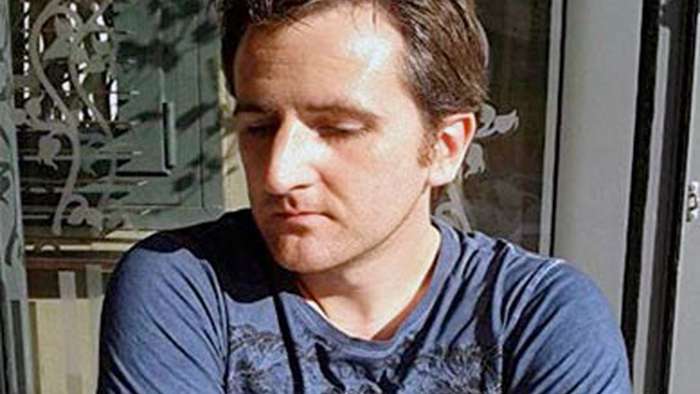I’ve always said that if you’re trying to get into Swans and you don’t like what you hear, just move two albums down and go again — it’s always a completely different band. Here I pick out a few highlights to illuminate some of the extremes Swans have reached on this journey.
“The Sound”
Why not start in grand fashion? One of Swans’ first true epics, “The Sound” builds from a creaking ambient opening to an eventual roar that hits you in the chest, tears at your clothing and conjures up ecstasy before descending, leaving you in an extended stunned moment. The reputed loudest band in the world had discovered that the dynamics within a piece of music could make a loud feel louder by contrast with the moments surrounding it, while by the same virtue making quiet feel crushing. Much was made of post-rock’s orchestral pretensions but Swans were already there and, somehow, one doesn’t notice that there are barely eight unique lines to the entire lyrics because the music has such drama, movement and progression.
“Love of Life“
A jarring contrast to much of what came before and a path left unexplored, “Love Of Life” was a surging and excitable combination of tribal drumming, cyclical guitar patterns, and incantatory lyrics that truly felt like a celebration. Gira answered and echoed on each line by Jarboe, thus creating a call-response that affirms the righteousness and sanctity of every utterance pushing us forward while the music never lets us breathe for a moment. It’s a thrill — a three and a half minute rush toward some unknown threshold. I’ve never read or contemplated the words themselves, asked what they mean, sought to understand the vision they present — all I’ve ever felt is the thrill of being carried along by some wild hallucination.
“Blind”
Beyond the beauty of the song, my appreciation of it is based on the skill of its lyrics.
Each verse ends on a recurring reflection on aging. In the first, the young man feels immortal “strong, clear-minded;” the second verse then refutes the first pointing out, “I created a lie. And though my body was strong I was self-deluded, confident” — in both cases, the final two words are “and blind,” the undermining is built in directly. The final verse has a more fundamental rejection: “I was never young. Nothing has transpired. And when I look in the mirror I feel dead, I feel cold, I am blind.” There’s a move to the present tense as well as an overall refusal to claim some kind of authority over his younger self — he’s still precisely what he always was, like we all are, and the idea that we become wiser through experience is a useful illusion. Around this motif, the song is laced with self-reflections: the first verse dwells on what sounds like an echo of Gira’s time in jail in Israel at age 15-16, while the third is focused on his (well-documented) issue with alcohol during the ‘90s. Throughout the words chosen are sparse, unsparing and sharp.
“Freak”
Swans' reputation for being slow and loud belied how swift they could be. On Filth, their debut, there was still a lot of punk to be washed out of their sound. A track like “Freak” batters the listener over the head but, on closer listening, different elements within the music are moving at different speeds, there are layers pulling against one another with the percussion, or the guitar, or the bass, or the vocals dragging behind the pace or darting forward at pace. The other part of their reputation, for nihilistic and graphic brutality is on display meanwhile in howls of, “You’re gonna murder somebody weak, strong men win at violence and abuse.” Gira has a keen eye for the self-righteous nastiness of cruel humans.
“To Be Kind”
Gira’s voice dominates this song. In an era where TV talent shows have coached us to think that holding a note perfectly is the be-all and end-all of good singing, I’m far more appreciative of the ability to break the rules. Gira’s voice breaks, quavers and shakes in a way that feels entirely deliberate — a way to emphasize an emotion or wrong-foot and wake up any listener who might dare sleep or tune out. The music is kept on such a tight leash, allowed to sway like a seasick sailor through beguilingly gentle waves, a dream state — until that one moment where everything is allowed to break, it all shatters and the full weight of the band powers down over the listener’s head in torrents. The final two minutes, there’s a hint of a triumphal march, a rolling celebration, but the bludgeoning is just too heavy-handed to let something that comfortable emerge — the final minute stamps feedback again and again into our faces.
“Money Is Flesh”
Part of Swans’ longevity has come about by simply refusing to be a part of any club that might let them in: Swans evaded post-punk, never embraced industrial, steered well clear of alternative rock, predated post-rock, touched on drone — there’s no single genre label that ever fit the band for more than a fleeting moment. This mid-‘80s excursion showed the band’s unappreciated openness to the potential of studio effects, early sampling technologies, their ability to take something as recognizable as a horn stab and turning it into something disruptive and disturbing. Gira’s lyrics repeat over in a way that gives them an arch-meaningfulness in the same way the utterances of Beckett’s characters would gain something through the precision poured into limited words.
“Whisky Johnny”
An exceedingly rare outing for Gira outside of his core projects. It’s a ribald cavalcade of a track, a party tune, Gira’s voice instantly recognizable but expressing a levity and self-indulgence that’s near wholly absent from Swans. Anyone who has caught a Gira video interview, or simply heard him crack one-liners from the stage during a show, will know that he’s a man with a charmingly dry sense of humor and an artful way with words — it’s just not something caught on a song very often (try “Mean Monster Mike” sometime). Here he lends his baritone to an old drinking song and has lashings of fun carousing and whipping up fellow inebriates. Underpinning it, of course, is the defiance of a seasoned drinker — one last hurrah before the glass hits the table — with Gira quitting alcohol a few years back after some thirty years of it being a daily presence.
“New Mind”
Very much the “pop song” version of early Swans’ sound, “New Mind” is still heavy, but it swings too and there’s triumphant brightness to the instrumentation. Never one for obviousness, Gira wanted to make an album inspired by the televangelist phenomenon — but he wanted to avoid the cliché of a post-punk musician making an anti-religious statement.
Instead he sought to inhabit the very real joy that can come through belief and submission to a higher power. The result is a song that goes someway to realizing Queen’s “Radio Gaga” vision of music as political or religious messiah cult: there’s a thrill to the singer’s voice as he bows to faith and invites you to do the same.
“Cloud of Unknowing”
I’ve always despised anti-intellectualism in music. For me, the best music has a physicality and emotional impact that is undeniable, but works on deeper levels if one ever chooses to contemplate them. In recent years Swans have blurred the line between improvisation and score, each song is drilled to perfection then amended according to the mood of the moment by Gira. There are echoes of various forms of new composition, hints at the wilder ends of experimental rock or metal, but I listen to “Cloud Of Unknowing” and it’s the creaks and grinds that spill over the top of the backdrop of percussion that stand out for me. Or it’s the way long passages cohere, come apart, reform into what might be a completely different song in less assured hands. Nothing here is ever the same — I’m not sure any passage longer than thirty seconds in this entire twenty-five minute epic is precisely the same as any other — it’s a feat of composition to call up a maelstrom of this intensity and always keep it under perfect control. I’m lost in the music in a way that is usually just a cliché but comes true all too often in Swans.
--
For more, check out SWANS: Sacrifice & Transcendence, available from online retailers now.








